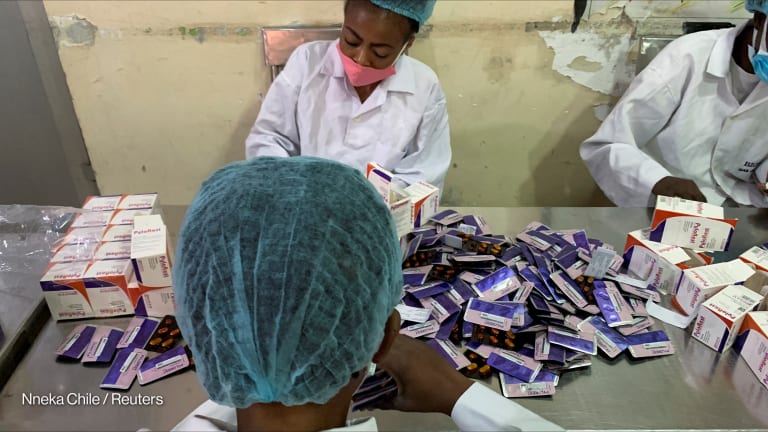
Broadly, political leadership across the African continent has not been forceful enough in demanding that COVID-19 vaccines make their way quickly to the African continent, said Dr. Ayoade Olatunbosun-Alakija, co-chair of the African Union’s African Vaccine Delivery Alliance.
Sign up for Devex CheckUp
The must-read weekly newsletter for exclusive global health news and insider insights.
While much of the global critique around vaccine equity has focused on high-income countries hoarding doses, export bans on vaccines, and pharmaceutical companies failing to expand production through technology transfers — Olatunbosun-Alakija argues that many of the political leaders on the African continent also carry blame.
“As we hold the global north and their leaders accountable, we must also hold our own African leadership accountable for their failures,” she said, during a news briefing Thursday.
The continent has fully vaccinated under 4% of its population. The European Union and United Kingdom, by contrast, have vaccinated over 60% of their populations. The African continent faces a 470 million dose shortfall in reaching the global goal of vaccinating 40% of the population by the end of the year. Instead, the promised vaccine doses from COVAX and AU, if delivered, will help the continent reach 17%.
“The first line of every talking point needs to be Mr. President of whichever country, Mr. Foreign Minister: Where are the vaccines?”
— Dr. Ayoade Olatunbosun-Alakija, co-chair, African Union’s African Vaccine Delivery AllianceLast week, COVAX downgraded its end-of-the year estimates for delivery, cutting supplies to African nations by 25%. African nations have faced months of a “vaccine famine” following India’s decision to halt the export of doses in March — cutting COVAX’s access to doses from the Serum Institute of India, which it was overly reliant upon. In July, as high-income countries began to donate more vaccines, the program saw an uptick in deliveries and African nations began to see more deliveries.
But even when doses are promised to African nations — either by manufacturers or through donations — those doses trickle in slowly. And these delays are costing lives. During a separate press briefing Thursday, Dr. John Nkengasong, director of the Africa Centres for Disease Control and Prevention, said that between June and August, 72,000 people died as a third wave of the pandemic swarmed the continent.
“The timing is not good. And we want the doses sooner. And we're not happy with the pace at which some of our manufacturers are supplying us,” said Aurélia Nguyen, COVAX managing director at Gavi, the Vaccine Alliance.
The AU has separately secured 400 million Johnson & Johnson does for countries to purchase, partially produced in South Africa. But these doses are also arriving in countries slowly. Olatunbosun-Alakija said Nigeria expects to receive 3 million of these doses this month, but has only received about 177,000.
She said many African leaders were “lulled into a false sense of complacency because they thought that their needs were being covered, either by COVAX or by the pooled scheme” with the AU.
She added that instead of advocating for more vaccines, some politicians pillaged COVID-19 relief and social intervention funds.
“Some of our leaders have seen this pandemic as a way to enrich themselves and take even more from those in need,” she said.
This has fueled distrust among some populations, which some health workers rolling out vaccine campaigns now have to manage.
She called upon African leadership to take advantage of the meetings next week at the United Nations General Assembly to put vaccine equity at the top of the agenda.
“We elect leaders for moments of crisis,” she said. “Every side meeting they have, needs to begin with: Our people are dying or getting long COVID. The first line of every talking point needs to be Mr. President of whichever country, Mr. Foreign Minister: Where are the vaccines?”
She excluded from her criticism South African President Cyril Ramaphosa, who has been at the forefront of leading vaccine negotiations for the AU. Nkengasong called him an “extraordinary, exceptional hands-on warrior in this crisis.”
She also excluded Rwandan President Paul Kagame who has vocalized his frustrations around the slow rollout of vaccines and has pushed to establish mRNA vaccine manufacturing in his country. But more broadly, she said, “there has been a really loud silence from the rest of Africa’s political leadership.”
“Had [Nigerian] President Buhari, or [Kenyan] President Kenyatta, [or the Democratic Republic of the Congo] President Tshisekedi knocked on the door of Pfizer, knocked on the door of Moderna, they could not be turned down, particularly those three countries, because those are such big countries,” she said. “Our geopolitical power should have helped us with this moment.”









